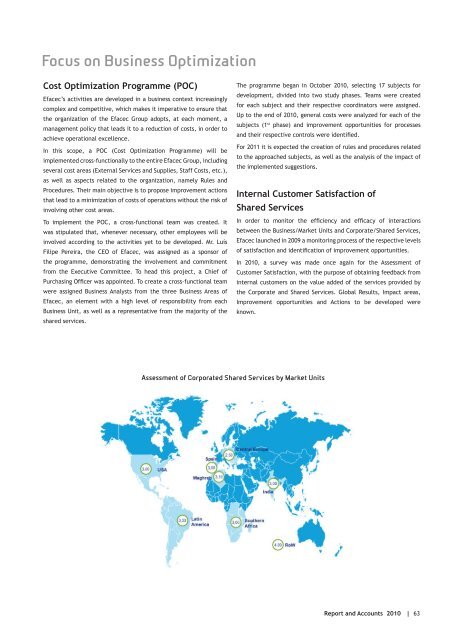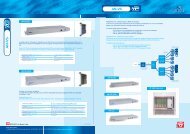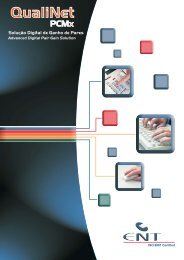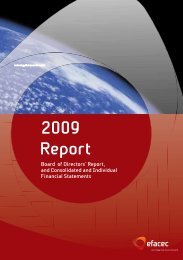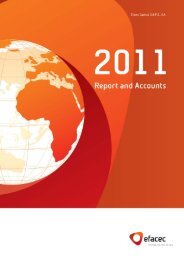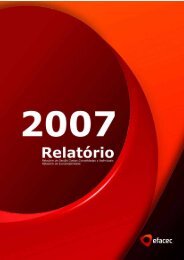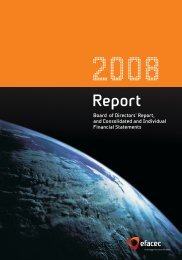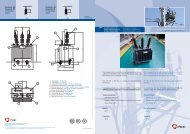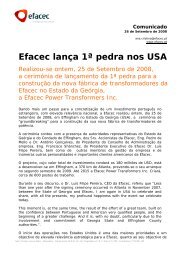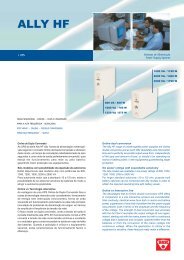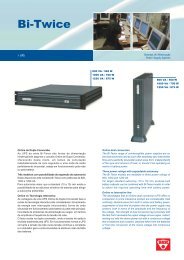Relatorio de gestao_2010_INGLES.indd - Efacec
Relatorio de gestao_2010_INGLES.indd - Efacec
Relatorio de gestao_2010_INGLES.indd - Efacec
You also want an ePaper? Increase the reach of your titles
YUMPU automatically turns print PDFs into web optimized ePapers that Google loves.
Focus on Business Optimization<br />
Cost Optimization Programme (POC)<br />
<strong>Efacec</strong>’s activities are <strong>de</strong>veloped in a business context increasingly<br />
complex and competitive, which makes it imperative to ensure that<br />
the organization of the <strong>Efacec</strong> Group adopts, at each moment, a<br />
management policy that leads it to a reduction of costs, in or<strong>de</strong>r to<br />
achieve operational excellence.<br />
In this scope, a POC (Cost Optimization Programme) will be<br />
implemented cross-functionally to the entire <strong>Efacec</strong> Group, including<br />
several cost areas (External Services and Supplies, Staff Costs, etc.),<br />
as well as aspects related to the organization, namely Rules and<br />
Procedures. Their main objective is to propose improvement actions<br />
that lead to a minimization of costs of operations without the risk of<br />
involving other cost areas.<br />
To implement the POC, a cross-functional team was created. It<br />
was stipulated that, whenever necessary, other employees will be<br />
involved according to the activities yet to be <strong>de</strong>veloped. Mr. Luís<br />
Filipe Pereira, the CEO of <strong>Efacec</strong>, was assigned as a sponsor of<br />
the programme, <strong>de</strong>monstrating the involvement and commitment<br />
from the Executive Committee. To head this project, a Chief of<br />
Purchasing Offi cer was appointed. To create a cross-functional team<br />
were assigned Business Analysts from the three Business Areas of<br />
<strong>Efacec</strong>, an element with a high level of responsibility from each<br />
Business Unit, as well as a representative from the majority of the<br />
shared services.<br />
The programme began in October <strong>2010</strong>, selecting 17 subjects for<br />
<strong>de</strong>velopment, divi<strong>de</strong>d into two study phases. Teams were created<br />
for each subject and their respective coordinators were assigned.<br />
Up to the end of <strong>2010</strong>, general costs were analyzed for each of the<br />
subjects (1st phase) and improvement opportunities for processes<br />
and their respective controls were i<strong>de</strong>ntifi ed.<br />
For 2011 it is expected the creation of rules and procedures related<br />
to the approached subjects, as well as the analysis of the impact of<br />
the implemented suggestions.<br />
Internal Customer Satisfaction of<br />
Shared Services<br />
Assessment of Corporated Shared Services by Market Units<br />
In or<strong>de</strong>r to monitor the effi ciency and effi cacy of interactions<br />
between the Business/Market Units and Corporate/Shared Services,<br />
<strong>Efacec</strong> launched in 2009 a monitoring process of the respective levels<br />
of satisfaction and i<strong>de</strong>ntifi cation of improvement opportunities.<br />
In <strong>2010</strong>, a survey was ma<strong>de</strong> once again for the Assessment of<br />
Customer Satisfaction, with the purpose of obtaining feedback from<br />
internal customers on the value ad<strong>de</strong>d of the services provi<strong>de</strong>d by<br />
the Corporate and Shared Services. Global Results, Impact areas,<br />
Improvement opportunities and Actions to be <strong>de</strong>veloped were<br />
known.<br />
Report and Accounts <strong>2010</strong> | 63


